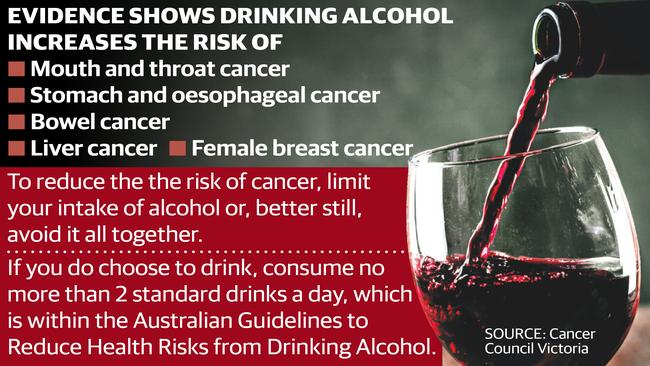Even moderate amount of alcohol may increase risk of breast cancer relapse
EXCLUSIVE: WOMEN survivors of breast cancer who drink even moderate amounts of alcohol — the equivalent of half a bottle of wine a week — may increase the risk of relapse.
News
Don't miss out on the headlines from News . Followed categories will be added to My News.
WOMEN survivors of breast cancer who drink even moderate amounts of alcohol — the equivalent of half a bottle of wine a week — may increase the risk of the cancer returning.
Alcohol consumption is a known risk factor for developing the disease, which affects one in eight Aussie women.
BREAKTHROUGH IN STARVING CANCER CELLS OF THE FOOD THEY ARE ADDICTED TO
MELBOURNE SCIENTISTS BREAST CELL STUDY OFFERS CANCER TREATMENT HOPE
But the new Cancer Council Victoria findings have the potential to change public health guidelines, to inform survivors that reducing or quitting drinking could lessen their risk of relapse.
Study author Dr Anna Boltong said half of the 16 studies they reviewed indicated “a modest but significant” association between alcohol consumption of 6 grams a day and increased breast cancer recurrence or the development of second primary cancer.
“Contrary to current public health recommendations, alcohol consumption as low as 6g per day was found to modestly increase the risk of breast cancer recurrence, particularly in post-menopausal women,” Dr Boltong said.
This amount of alcohol was equivalent to three teaspoons of wine per day, she added.

Dr Boltong said: “This is much less than Australian public health guidelines for reducing health risks from drinking alcohol, which recommend a limit of two standard drinks (20g of alcohol) per day for healthy men and women to reduce their risk of related disease and injury.
“Based on the findings of this study it may be beneficial for public health authorities to consider guidelines specific for cancer survivors, rather than relying on prevention messaging,” she added.
None of the studies analysed showed alcohol caused the cancer to come back, only an association between intake and relapse.

Dr Boltong said although more research was needed to better understand any potential links between alcohol and breast cancer relapse, it was already considered a probable cause of breast cancer, possibly due to increasing endogenous oestrogen levels or DNA damage to cells.
Alcohol Beverages Australia executive director Fergus Taylor said the industry supported consistent advice on alcohol consumption, but it should be based on more credible and accurate evidence.
“The study’s scope is extremely limited and its results inconclusive ... Its authors notably acknowledge methodological problems regarding the results’ interpretation,” he said.
The findings are being presented at a Behavioural Research in Cancer Control conference being held this week in Melbourne.


